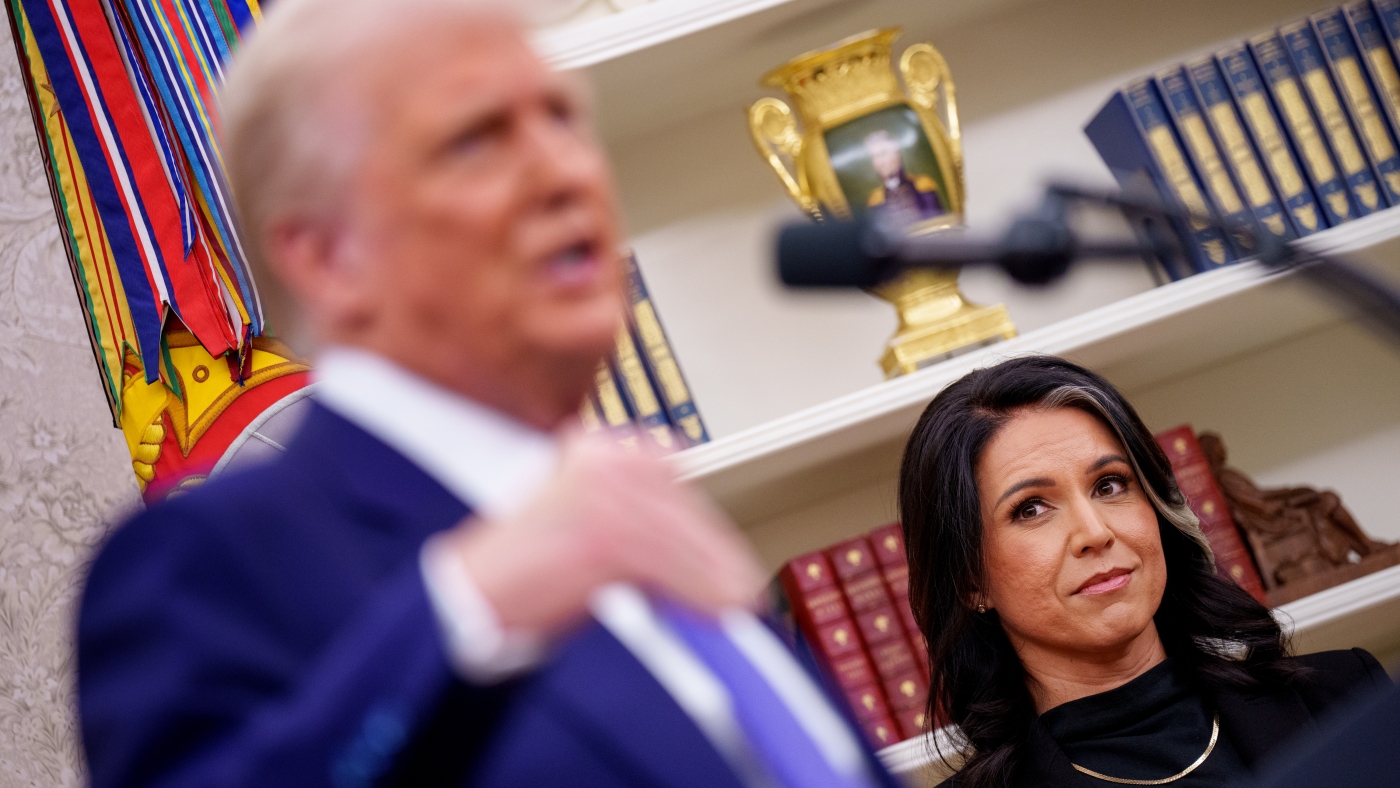
President Trump, accompanied by Tulsi Gabbard, speaks after Gabbard is sworn in as director of national intelligence on February 12.
Andrew Harnik/Getty Images
hide caption
toggle caption
Andrew Harnik/Getty Images
The Office of the Director of National Intelligence, or ODNI, has published the latest in a series of recent Trump administration reports aimed at scrutinizing years-old intelligence community conclusions about Russian interference in the 2016 U.S. presidential election in favor of Donald Trump.
For years, President Trump has spread disinformation about those conclusions, calling the entire Russia investigation a “hoax,” despite supporting evidence that has been systematically reviewed by intelligence agencies, lawmakers and Department of Justice lawyers.
On Friday afternoon, ODNI published a press release asserting that its director, Tulsi Gabbard, “revealed overwhelming evidence” that President Obama and his national security officials “manufactured and politicized intelligence” to launch a “years-long coup against President Trump.” Gabbard echoed those conclusions across social media platforms X and Truth Social, and in interviews on Fox News in the days that followed.
Among the materials Gabbard declassified are emails and memos published under the banner of the new “Director’s Initiatives Group,” formed to “execut[e] President Trump’s Executive Orders aimed at rebuilding trust in the [Intelligence Community].”
In those files, Obama officials exchange correspondence about Russian attempts at election interference, concluding that it was unlikely Russian hackers would successfully compromise physical election infrastructure or alter vote totals without detection but might be successful in influencing voter confidence in the election.
“There is no indication of a Russian threat to directly manipulate the actual vote count through cyber means,” wrote an ODNI official whose name was redacted in a newly published email. “However, as seen in recent media reporting, any cyber activity directed against the election infrastructure is likely to have an effect on public confidence,” they continued.
Gabbard also released a timeline that outlines events leading up to the 2017 assessment that Russia attempted to influence the 2016 election. The timeline focuses on the conclusions by intelligence community officials that Russia likely had not and would not use cyber means to directly compromise voter systems or change vote tallies.
Gabbard argues that these conclusions are hypocritical and poke holes – if not directly contradict – the intelligence community’s 2017 assessment that Russian attempted to influence the election.
But Obama officials never claimed that Russian hackers had successfully changed votes or hacked election infrastructure at scale.
The 2017 assessment focuses on Russian influence, from social media disinformation networks, hack-and-leak campaigns, Russian bot farms and other more psychological efforts made by Russian actors. Intelligence community experts acknowledge that Russian hacking targeting election infrastructure was likely limited and aimed at gathering intelligence.
Democrats were quick to criticize the new ODNI publication as contradictory to previous reviews of the assessment, as well as dishonest and politically motivated.
“This is utter nonsense,” wrote Rep. Jim Himes, D-Conn., on the social media platform X, formerly known as Twitter.
“It is sadly not surprising that DNI Gabbard, who promised to depoliticize the intelligence community, is once again weaponizing her position to amplify the president’s election conspiracy theories,” wrote Sen. Mark Warner, D-Va., the vice chairman of the Senate Intelligence Committee, on X.
Meanwhile, earlier in July, CIA Director John Ratcliffe published a separate report reviewing the CIA’s internal processes while compiling the 2017 assessment. On X.com, he claimed that Obama officials had “manipulated intelligence” in an effort to “get Trump.”
However, like the newly declassified emails and memos, the CIA report doesn’t appear to directly contradict the central thesis of the 2017 assessment: that Russia attempted to influence the American public and their perceptions of the 2016 election.
The CIA’s “lessons-learned” review of the analytic procedure behind the 2017 assessment identified several recommendations for stricter compliance with CIA standards, but ultimately said that the actual conclusions made in that assessment were “defensible.”
(Except for the headline, this story has not been edited by PostX News and is published from a syndicated feed.)



